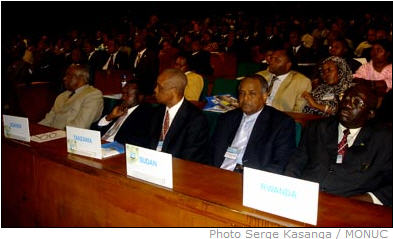 The regional parliamentary meeting on the International Conference on the Great Lakes region, which was hailed as "a step forward" by the UN, was concluded by Prime Minister Antoine Gizenga on February 28, 2007 at the Palais du Peuple in Kinshasa.
The regional parliamentary meeting on the International Conference on the Great Lakes region, which was hailed as "a step forward" by the UN, was concluded by Prime Minister Antoine Gizenga on February 28, 2007 at the Palais du Peuple in Kinshasa.
For three days, from February 26 to 28, 2007, the parliamentarians considered and debated on their role in contributing to the fast ratification and implementation of the Great Lakes regional pact on security, stability and development, with the support of the respective populations.
The respective countries committed themselves to taking the necessary arrangements to ratify the pact, to sensitize their people and their parliamentarians.
They also committed themselves to establishing a regional parliamentary forum in order to encourage dialogue; to contribute to the mobilization of internal and external resources for the implementation of the programs and to urge their states to quickly honour their financial contribution to the ordinary budget of the secretariat of the Great Lakes pact.
Furthermore, parliamentarians from the eleven signatory countries of the pact formulated some recommendations to the governments of the core countries, to the secretariat of the conference and to the international community.
The recommendations included the harmonization of national legislation for the implementation of the protocols; the implementation of arrangements to assure their contributions to the special fund for reconstruction of the region; as well as all other commitments that result from the signature and the ratification of the Pact.
Finally, the international community, notably the UN and the African Union, were invited to continue their support for peace and reconstruction of the Great Lakes region.
These good intentions are commendable, and it must not be forgotten that the countries of the region have a lot of work to accomplish. Indeed, the zone of Rwanda, Uganda and the DR Congo was the most unstable during the last decade with the East of the DR Congo its epicentre.
That is why, as elabourated by Ross Mountain, the Deputy Special Representative of the Secretary General of the UN in the DRC, that “the best way to establish lasting peace is to reunify people around collective and concrete initiatives toward peace, stability and development with a shared impulse and respect for cultural diversity and compared history.”
Reiterating that the direct participation of Rwanda and Uganda in the conflict in DR Congo was long over, Ross Mountain said that if “parliamentarians from Rwanda, Uganda, the DRC and Burundi have met to debate the ratification of the pact, it means that a step forward has been taken in the region.”
In addition, the population of the 11 member states of the conference was estimated at 241 million in 2004. According to the projections of the United Nations, this figure will increase by 33% to 320 million people region in ten years time. By 2015, the region will represent 37% of the total population of Sub-Saharan Africa.
Related articles
- • Congo Army Takes Control of Mbuzi Hill From M23 Rebels (November 4, 2013)
- • Regional Leaders Sign DR Congo Peace Deal (February 24, 2013)
- • Thousands of Women March Against M23 Rebels in Kinshasa (November 24, 2012)
- • UN Security Council condemns 'any and all outside support' to M23 rebels (October 19, 2012)
- • At high-level meeting, Ban urges political solution to crisis in eastern DR Congo (September 27, 2012)
- • DR Congo, Rwanda Sign Pact to Fight Rebels in Eastern Congo (July 15, 2012)
- • UN, AU vow to eradicate Ugandan rebel group LRA in 2012 (January 5, 2012)
- • Tshisekedi Says He Won, Can He Prove It? (December 17, 2011)
- • Observers Hail Successful DR Congo Elections (December 1, 2011)
- • Security Council extends mandate of UN mission in DR Congo (June 28, 2011)
- • Rights Groups: Strengthen Civilian Protection Before Elections (June 9, 2011)
- • Great Lakes Regional Summit to Focus on Congo Resource Exploitation (December 15, 2010)
- • UN Sanctions FDLR Leaders, CNDP Rebel Commander Integrated into Army (December 2, 2010)
- • UN launches patrols to head off rebel violence during holiday season (December 1, 2010)
- • Congo Defense Minister Rejects UN Allegations against Army (October 17, 2010)
- • Four African nations crack down on LRA (October 16, 2010)
- • Rebel leader presumed responsible for mass rape arrested (October 5, 2010)
- • UN DR Congo Report Exposes Grave Crimes (October 1, 2010)
- • UN says peacekeepers 'failed' DR Congo rape victims (September 7, 2010)
- • UN Defends Inaction on Mass Rapes in Eastern Congo, Government Missing in Action (August 26, 2010)
- • Two Suspects Arrested in Attack on MONUSCO Base (August 20, 2010)
- • Ban Ki-moon deplores deadly attack against blue helmets in North Kivu (August 18, 2010)
- • Ban Ki-moon inaugurates new phase of UN mission in DR Congo (July 1, 2010)
- • Congo Celebrates 50th Anniversary of Independence (June 30, 2010)
- • Top UN envoy bids farewell to first batch of blue helmets leaving DR Congo (June 16, 2010)
- • Veteran United States diplomat appointed to top UN post in DR Congo (June 9, 2010)
- • Top UN officials urge inquiry into killing of Congolese human rights activist (June 3, 2010)
- • UN to reduce DR Congo peace force (May 28, 2010)
- • Security Council agrees to convert UN mission in DR Congo into stabilization force (May 28, 2010)
- • U.S. Official Sees Improvement in Africa's Great Lakes Region (May 26, 2010)







